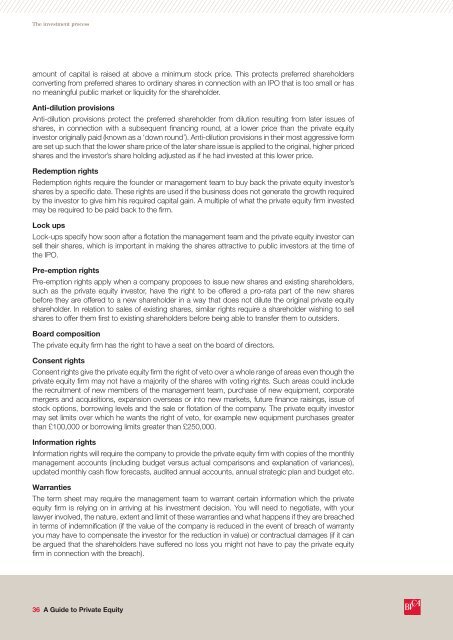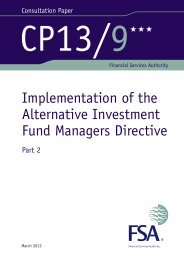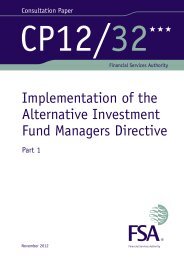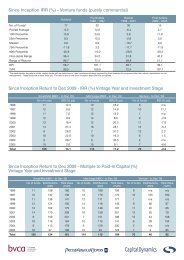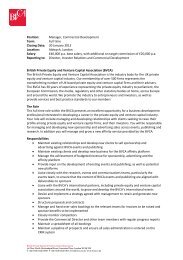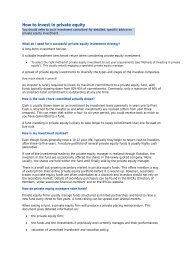A Guide to Private Equity - BVCA admin
A Guide to Private Equity - BVCA admin
A Guide to Private Equity - BVCA admin
Create successful ePaper yourself
Turn your PDF publications into a flip-book with our unique Google optimized e-Paper software.
The investment process<br />
amount of capital is raised at above a minimum s<strong>to</strong>ck price. This protects preferred shareholders<br />
converting from preferred shares <strong>to</strong> ordinary shares in connection with an IPO that is <strong>to</strong>o small or has<br />
no meaningful public market or liquidity for the shareholder.<br />
Anti-dilution provisions<br />
Anti-dilution provisions protect the preferred shareholder from dilution resulting from later issues of<br />
shares, in connection with a subsequent financing round, at a lower price than the private equity<br />
inves<strong>to</strong>r originally paid (known as a ‘down round’). Anti-dilution provisions in their most aggressive form<br />
are set up such that the lower share price of the later share issue is applied <strong>to</strong> the original, higher priced<br />
shares and the inves<strong>to</strong>r’s share holding adjusted as if he had invested at this lower price.<br />
Redemption rights<br />
Redemption rights require the founder or management team <strong>to</strong> buy back the private equity inves<strong>to</strong>r’s<br />
shares by a specific date. These rights are used if the business does not generate the growth required<br />
by the inves<strong>to</strong>r <strong>to</strong> give him his required capital gain. A multiple of what the private equity firm invested<br />
may be required <strong>to</strong> be paid back <strong>to</strong> the firm.<br />
Lock ups<br />
Lock-ups specify how soon after a flotation the management team and the private equity inves<strong>to</strong>r can<br />
sell their shares, which is important in making the shares attractive <strong>to</strong> public inves<strong>to</strong>rs at the time of<br />
the IPO.<br />
Pre-emption rights<br />
Pre-emption rights apply when a company proposes <strong>to</strong> issue new shares and existing shareholders,<br />
such as the private equity inves<strong>to</strong>r, have the right <strong>to</strong> be offered a pro-rata part of the new shares<br />
before they are offered <strong>to</strong> a new shareholder in a way that does not dilute the original private equity<br />
shareholder. In relation <strong>to</strong> sales of existing shares, similar rights require a shareholder wishing <strong>to</strong> sell<br />
shares <strong>to</strong> offer them first <strong>to</strong> existing shareholders before being able <strong>to</strong> transfer them <strong>to</strong> outsiders.<br />
Board composition<br />
The private equity firm has the right <strong>to</strong> have a seat on the board of direc<strong>to</strong>rs.<br />
Consent rights<br />
Consent rights give the private equity firm the right of ve<strong>to</strong> over a whole range of areas even though the<br />
private equity firm may not have a majority of the shares with voting rights. Such areas could include<br />
the recruitment of new members of the management team, purchase of new equipment, corporate<br />
mergers and acquisitions, expansion overseas or in<strong>to</strong> new markets, future finance raisings, issue of<br />
s<strong>to</strong>ck options, borrowing levels and the sale or flotation of the company. The private equity inves<strong>to</strong>r<br />
may set limits over which he wants the right of ve<strong>to</strong>, for example new equipment purchases greater<br />
than £100,000 or borrowing limits greater than £250,000.<br />
Information rights<br />
Information rights will require the company <strong>to</strong> provide the private equity firm with copies of the monthly<br />
management accounts (including budget versus actual comparisons and explanation of variances),<br />
updated monthly cash flow forecasts, audited annual accounts, annual strategic plan and budget etc.<br />
Warranties<br />
The term sheet may require the management team <strong>to</strong> warrant certain information which the private<br />
equity firm is relying on in arriving at his investment decision. You will need <strong>to</strong> negotiate, with your<br />
lawyer involved, the nature, extent and limit of these warranties and what happens if they are breached<br />
in terms of indemnification (if the value of the company is reduced in the event of breach of warranty<br />
you may have <strong>to</strong> compensate the inves<strong>to</strong>r for the reduction in value) or contractual damages (if it can<br />
be argued that the shareholders have suffered no loss you might not have <strong>to</strong> pay the private equity<br />
firm in connection with the breach).<br />
36 A <strong>Guide</strong> <strong>to</strong> <strong>Private</strong> <strong>Equity</strong>


